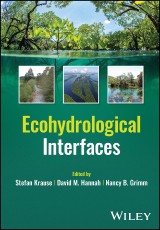Details

Ecohydrological Interfaces
1. Aufl.
|
104,99 € |
|
| Verlag: | Wiley |
| Format: | |
| Veröffentl.: | 13.10.2023 |
| ISBN/EAN: | 9781119489689 |
| Sprache: | englisch |
| Anzahl Seiten: | 432 |
DRM-geschütztes eBook, Sie benötigen z.B. Adobe Digital Editions und eine Adobe ID zum Lesen.
Beschreibungen
<b>Ecohydrological Interfaces</b> <p><b>Comprehensive overview of the process dynamics and interactions governing ecohydrological interfaces</b> <p>Summarizing the interdisciplinary investigation of ecohydrological interface functioning, <i>Ecohydrological Interfaces</i> advances the understanding of their dynamics across traditional subject boundaries. It offers a detailed explanation of the underlying mechanisms and process interactions governing ecohydrological interface functioning from the micro scale to the ecosystem and regional scale. <p>The multidisciplinary team of authors integrates and synthesises the current understanding of process dynamics at different ecohydrological interfaces to develop a unifying concept of their ecosystem functions. The work introduces novel experimental and model-based methods for characterizing and quantifying ecohydrological interface processes, taking account of innovative sensing and tracing technologies as well as microbial and molecular biology approaches. <p>Key questions addressed in the book include: <ul><li>Which conditions stimulate the transformative nature of ecohydrological interfaces?</li> <li>How are ecohydrological interfaces organized in space and time?</li> <li>How does interface activity propagate from small to large scales?</li> <li>How do ecohydrological interfaces react to environmental change and what is their role in processes of significant societal value?</li></ul> <p>As a research level text on the functionality and performance of ecohydrological interfaces, <i>Ecohydrological Interfaces</i> is primarily aimed at academics and postgraduate researchers. It is also appropriate for university libraries as further reading on a range of geographical, environmental, biological, and engineering topics.
<p>1. Ecohydrological interfaces as hotspots of ecosystem processes</p> <p>2. Biological activity as trigger of enhanced ecohydrological interface activity</p> <p>3. The four interfaces of riparian zones</p> <p>4. Organizational principles of hyporheic exchange flow and biogeochemical cycling in river networks across scales</p> <p>5. Groundwater-lake interfaces</p> <p>6. Coastal-groundwater interfaces</p> <p>7. Identifying and quantifying water fluxes at ecohydrological interfaces</p> <p>8. Heat as a hydrological tracer</p> <p>9. Sampling at groundwater-surface water interfaces</p> <p>10. Automated sensing methods for dissolved organic matter and inorganic nutrient monitoring in freshwater systems</p> <p>11. Tracing hydrological connectivity with aerial diatoms</p> <p>12. Measurement of metabolic rates at the sediment-water interface using experimental ecosystems</p> <p>13. Using diel solute signals to assess ecohydrological processing in lotic systems</p> <p>14. Evolving molecular methodologies for monitoring pathogenic viruses in ecohydrological interfaces</p> <p>15. Global environmental pressures</p> <p>16. Restoration of interface functions</p>
<p><b>Stefan Krause,</b> School of Geography, Earth and Environmental Science, University of Birmingham, UK and LEHNA — Laboratoire d’Ecologie des Hydrosystèmes Naturels et Anthropisés, Universitè Claude Bernard Lyon 1, France. <p><b>David M. Hannah,</b> School of Geography, Earth and Environmental Science, University of Birmingham, UK. <p><b>Nancy B. Grimm,</b> School of Life Sciences, Arizona State University, Tempe, USA.
<p><b>Comprehensive overview of the process dynamics and interactions governing ecohydrological interfaces</b> <p>Summarizing the interdisciplinary investigation of ecohydrological interface functioning, <i>Ecohydrological Interfaces</i> advances the understanding of their dynamics across traditional subject boundaries. It offers a detailed explanation of the underlying mechanisms and process interactions governing ecohydrological interface functioning from the micro scale to the ecosystem and regional scale. <p>The multidisciplinary team of authors integrates and synthesises the current understanding of process dynamics at different ecohydrological interfaces to develop a unifying concept of their ecosystem functions. The work introduces novel experimental and model-based methods for characterizing and quantifying ecohydrological interface processes, taking account of innovative sensing and tracing technologies as well as microbial and molecular biology approaches. <p>Key questions addressed in the book include: <ul><li>Which conditions stimulate the transformative nature of ecohydrological interfaces?</li> <li>How are ecohydrological interfaces organized in space and time?</li> <li>How does interface activity propagate from small to large scales?</li> <li>How do ecohydrological interfaces react to environmental change and what is their role in processes of significant societal value?</li></ul> <p>As a research level text on the functionality and performance of ecohydrological interfaces, <i>Ecohydrological Interfaces</i> is primarily aimed at academics and postgraduate researchers. It is also appropriate for university libraries as further reading on a range of geographical, environmental, biological, and engineering topics.

















